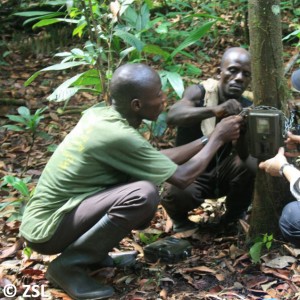Camera traps are revolutionising our ability to track the changing fate of wildlife. Often used in remote locations looking for elusive species, this automated digital device that takes a photo whenever an animal triggers an infrared sensor, is producing rare glimpses into the secret lives of animals.
In 2008, scientists from ZSL started a new programme designed to examine the status of the pygmy hippo, in Sapo National Park, Liberia. Working with Cambridge based conservation NGO Fauna and Flora International and the Liberian Forestry Development Authority, they designed a monitoring programme to improve our understanding of the pygmy hippo as well as other rare and threatened species in this, Liberia’s only National Park.
For the first time in Liberia, this monitoring programme has captured video footage of the Endangered pygmy hippo, leading to greater insight into the status of this elusive species.
While the threats to the pygmy hippo remain severe (particularly forest loss, fragmentation, and opportunistic hunting), this footage highlights that Sapo National Park could be an important stronghold for the rapidly depleting global population. In the rapidly changing country of Liberia, that stronghold could prove to be more important than we first thought.
United conservation strategy
These compelling pictures come at a time when the first global agreement on a united conservation strategy for the pygmy hippo has just been reached. By bringing together key stakeholders from Liberia, Guinea, Sierra Leone Côte d’Ivoire (the four countries where the remaining pygmy hippo populations can be found) the workshop identified important sites for pygmy hippo conservation, and developed a global conservation action plan for the species. The action plan includes the reinforcement of protected areas and the development of links with local industry to minimise the destruction of pygmy hippo habitat. With fewer than 3,000 pygmy hippos remaining, in increasingly isolated populations, the need for action to conserve the pygmy hippo has never been more urgent.
We are asking people to donate directly to the project in order to help ensure that the critical conservation actions identified in the strategy can be fulfilled in Liberia’s most important area for biodiversity. Please click here to support this proejct.

